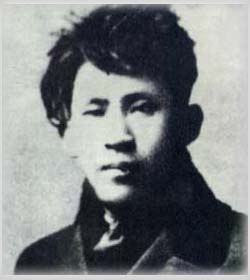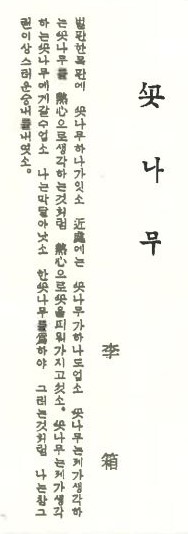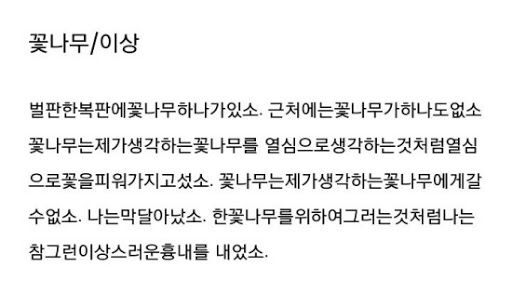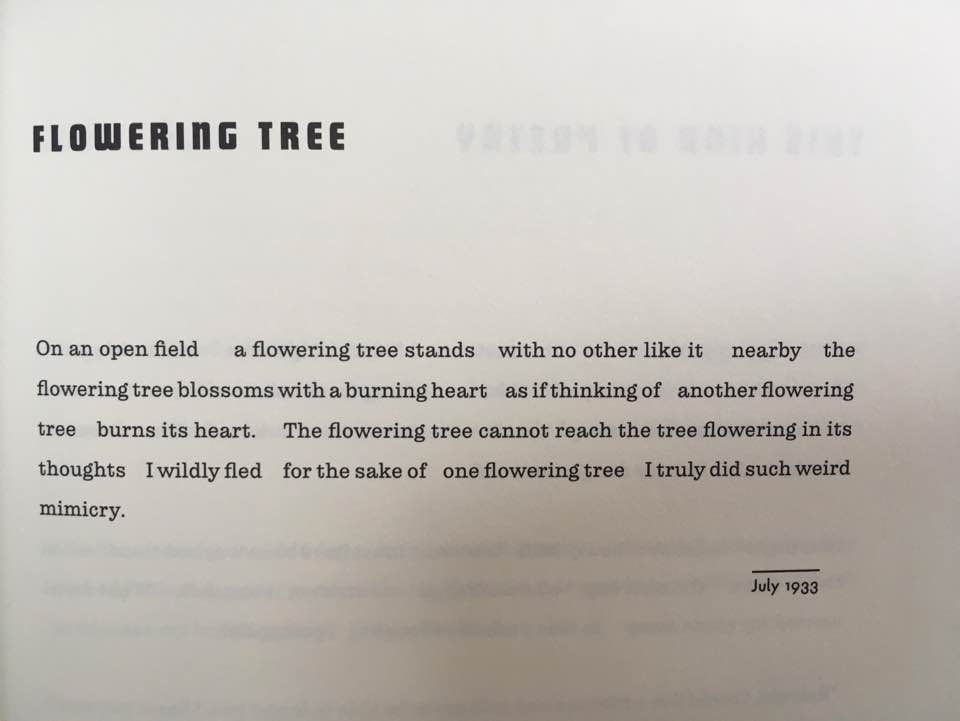After this equinox, tomorrow is the 110th Birthday of Yi Sang: the dark wizard, clown, and crown prince of modern Korean literature. Some still believe that his writings were the writings of a madman. Others think he was the greatest writer of his generation. A thread. 1/19
No one denies his radicality, and Korean literature has not been the same since his meteoric passage.
So, why should you read Yi Sang? I can only say what Yi Sang did for me. Even though Yi Sang lived and wrote in a time and place vastly different from where I am, 2/19
So, why should you read Yi Sang? I can only say what Yi Sang did for me. Even though Yi Sang lived and wrote in a time and place vastly different from where I am, 2/19
his evocations of a broken world and a soul caught in its doomed struggle for freedom and beauty gave me clear reflections of my heart’s fires that I could not find anywhere else. 3/19
Of heart’s fires, the poem that made me fall in love with Yi Sang was his 꽃나무, Flowering Tree in English. Joyelle writes about her encounter with this poem beautifully in her essay in Yi Sang: Selected Works: 4/19
“Art’s erotic likenesses. The immobility of the tree is radiant; the tree is as much flaring as flowering and it drives the speaker to Art, the ‘weird mimicry,’ rare replications, the ultimate place...one guesses that he, too, is radiantly immobilized in fire like the tree.” 5/19
There’s not much more I can say that isn& #39;t already captured in Joyelle’s words. Other than perhaps to say somethings about how I translated this poem. 6/19
I translated the Korean phrase “것처럼 kŏsch& #39;ŏlŏm” into English as “as if.” “As if” modifies here the speaker’s behavior, and signifies the tree’s inner state (“as if thinking”). The speaker’s “as if” points to his motivation. The tree’s “as if” points to its thoughts. 7/19
All this motivation and thinking is connected to 열심 (熱心, yŏlsim) in Yi Sang’s poem, a word that I translated as “burning heart.” 8/19
The two Chinese characters that make up yŏlsim are “hot/heated/burning (熱)” and “heart/mind (心)”. In Korean, “yŏlsim” customarily means passion, passionately, or some intense feeling. It is often used when someone says that they will try their best. 9/19
What is strange about how Yi Sang uses this word is the unusual grammatical ending he attaches to it. Usually, grammatical ending “-hi” (-히) is almost always attached to the word “yŏlsim,” which makes it an adjective. 10/19
But Yi Sang uses the grammatical ending “-ŭlo” (-으로) instead. This declension turns any word it modifies into a noun, and makes the modified word a source or cause of the activity. 11/19
So, even though “yŏlsim” is almost always used as an adjective that describes emotional state, Yi Sang’s play with grammar turns it into a conceptual noun that acts as a cause of the flower tree’s performance that defines its being. 12/19
That is why, instead of translating it as “the flower tree is passionately flowering,” I went with “blossoming with a burning heart.” 13/19
For me, when the speaker says that fleeing “for the sake of a flower tree” was a “weird mimicry,” the speaker does not mean that he imitated how the flower tree blossomed for the sake of another tree. The speaker is saying that he is imitating the tree’s “burning heart.” 14/19
The tree flowering “with a burning heart” (yŏlsimŭlo) is the only thing that the speaker sees, and “as if thinking of another flowering tree burns its heart” is the hypothetical reason that the speaker gives to explain what he has seen. 15/19
The speaker is thus suggesting that his fleeing “for the sake of a flower tree” imitates the “burning heart” of the flower tree, not the blossoming that this “burning heart” yields. 16/19
And like most of Yi Sang’s writing, the poem ends with an intensely heightened state of things without any way for us readers to relieve all the energy that we’ve accumulated from the experience. 17/19
And, that for me is why I keep returning to Yi Sang—his words summon something from deep within me to clearly relive my unexpressed desires, and this in turn makes me want to live and flee wildly for their sake. His words ignite.18/19
And Yi Sang expressed his vision during one of the darkest periods of Korean history. And he did all this as he was dying from tuberculosis. And recently, I keep learning more from him than I ever did before. 19/19

 Read on Twitter
Read on Twitter





